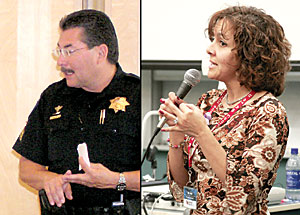 |
|
FILE PHOTO
|
UAPD spokesman Sgt. Eugene Mejia and abuse specialist Tina Tarin gave safety tips and advice to 7 percent of incoming freshman this year. Last year at least 93 percent of students attended the safety meetings, which are no longer mandatory this year after a grant for the program was not renewed. ��
|
|
|
By Andrew O'Neill
Arizona Daily Wildcat
Wednesday, August 8, 2005
Print this
In an effort to make the new student orientation process more focused on academic matters, and following the loss of a grant, a new orientation task force comprised of various UA faculty and administrators decided to make the campus safety and sexual assault presentation shorter and optional at all orientation sessions this year.
In previous years, the safety seminar was a mandatory part of the orientation process. Incoming freshmen heard 15-minute presentations from both the University of Arizona Police Department and the OASIS Program for Sexual Assault and Relationship Violence. However, this year freshmen could elect to skip the 20-minute presentation representing both safety organizations.
"The primary purpose of orientation is academic," said Patti Ota, vice president for enrollment management and chair of the New Student Orientation Task Force which made the decision.
"Everybody's not ready to hear the same information at the same time," said Lori Goldman, director of enrollment services and also a member of the task force.
Goldman said the audience needs to be receptive to the information being provided, and it is difficult to impart the message of campus safety to students who are more concerned with academics, housing, and other matters.
"That's not to say it's not valuable information," Goldman said.
Both women said the modified orientation process provides students with more flexibility in getting their own situations sorted out.
In addition to the campus safety presentation, Goldman said students may choose from a wide selection of presentations, including career services, the honors program, meal plans and ROTC.
"It makes the experience more personalized," Goldman said.
She said there might be other venues in addition to the orientation sessions for students to learn more about campus safety issues, such as residence halls and different club meetings.
But this troubles Campus Health employees and other safety professionals.
"We can't be helpful if people don't know about us," said Tina Tarin, a violence prevention specialist at OASIS.
Tarin said OASIS offers free and confidential counseling to students, faculty and staff who are victims of interpersonal violence, such as sexual assault, relationship violence and stalking.
Tarin said her organization did a co-presentation with the UAPD, and the best way to inform students about their services was through the mandatory orientation presentations.
"Because we would co-present with UAPD, I think it gave students a good idea about how well UAPD works with other programs on campus to provide for their safety," Tarin said.
She said many people who have come to OASIS for counseling first heard about their services during an orientation session.
Tarin said she estimates that when her presentations were mandatory she had been reaching 93 percent to 95 percent of all incoming students.
Now that these sessions are no longer compulsory, she said only about 7 percent of incoming students learn about campus safety resources.
"I was disappointed at the lack of attendance at these sessions," said Sgt. Eugene Mejia, the crime prevention supervisor and UAPD spokesman.
Mejia works with Tarin on the campus safety presentations, which not only inform students what services are available to them, but also how drugs and alcohol are linked to increases in violence and aggressive behavior.
Mejia said as both a parent and law enforcement official, it is extremely important to emphasize the importance of safety issues at a university.
"We at a university should think that safety and academics go hand in hand," he said.
Both Mejia and Tarin said they had not been consulted by the task force about the changes being made in the orientation schedule.
"We need to revisit the decision that was made this year," Mejia said.
Students have mixed feelings about the now-voluntary presentation.
"I think that's a bit dangerous," said Julia Tatum, a chemistry senior who has done volunteer work with OASIS.
Tatum said students don't think about the risks involved in their behavior, and that guys-not just girls-need to hear the message from safety officials.
"I think most people are relatively ignorant to these problems on campus," Tatum said.
Daniel Weber, a communications senior, said he isn't bothered by the fact it has become an optional part of orientation, but it is still better to be informed.
"It can't hurt to educate people," Weber said.
In the end, Mejia said he is hopeful that UAPD and OASIS can work with the task force to make changes in the future.
-Jacob Konst contributed to this article
